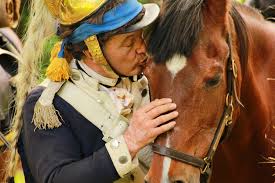“Boston November 18 1774
I hereby acknowledge the Receiving of Mr Caleb Hayward [o]f Dorchester be Saddle and Bridle Value Twelve Dollars which I received in Payment [o]f Part of a Debt due to me from the Estate of Captain John Hayward [o]f Braintree deceased which Sum of twelve Dollars I am informed is charged by the sd Caleb Hayward to this Account of Mrs David Pie[r?]son Hayward of Braintree [inked-out] one of the Administrators of the Estate of the aforenamed Captain John Hayward – Joseph Warren”
Source: Johns Collin Warren Papers Boston: Massachusetts Historical Society, box 2 of 23. a.l.s. in Warren’s handwriting throughout
Commentary: Joseph Warren was not meticulous in keeping his accounts or in collecting debts owed to him for medical services. In any case many of his patients were hard pressed to pay due to their constricted business opportunities resulting from the Boston Port Bill, one of the Coercive Acts.
In this surviving documented transaction, Joseph Warren accepts a saddle and bridle in partial payment of a debt due him from the estate of Caleb Hayward of Dorchester. It implies that Warren owned a horse at the time.
Just two months later, Joseph Warren hit up his youngest brother John for an accelerated cash payment on his former medical trainee’s apprenticeship debt. Dr. Joseph Warren was, as many other professionals and tradesmen, desperately short of cash. Warren’s colleague and fellow Son of Liberty Dr. Benjamin Church, Jr. pursued an entirely different solution to his cash shortage.
The charming photo, taken and posted by the blogster of ‘Naples and Hartford in Season,’ is of an American Revolutionary war cavalry reenactor at a May 2014 event in Wethersfield, Connecticut. Rider, horse, and bridle appear to be getting along famously.

 Follow
Follow